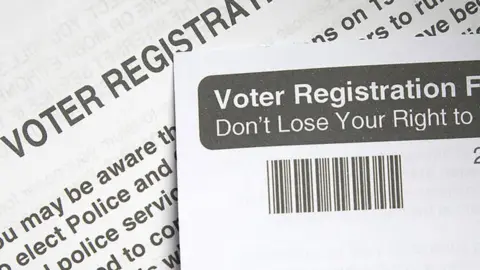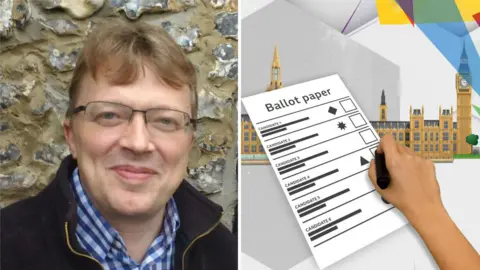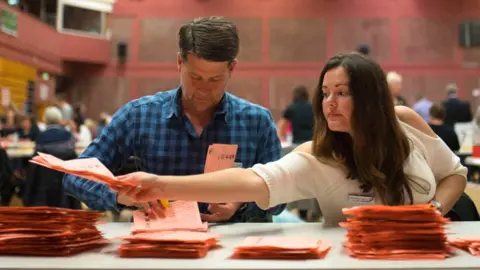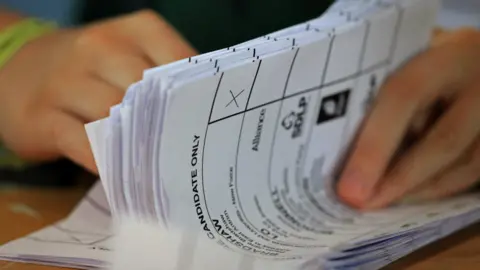General election 2019: Can I vote as someone else?
 Getty Images
Getty ImagesThe general election on 12 December has got some of our readers curious about the voting process. Here are the answers to some of your questions.
What's to stop me voting as someone else?
 Helen Barclay
Helen BarclayHelen Barclay, 45, from Cheshire, asked: "As I don't need a polling card or ID to vote, what is to stop me giving someone else's name and address and voting for them?"
Ms Barclay is right - you don't have to take your poll card or show any identification when you go to vote.
But if you vote as anyone else - living, dead or fictitious - you would be committing an offence called personation, the Electoral Commission said.
In cases of suspected personation the poll clerk reports the matter to the returning officer, who tells the police.
If successfully prosecuted, the person could face up to two years in prison and a fine.
Can someone look into how I voted?

Keith Wood Smith, 53, from Hemel Hempstead asked: "Why do election officials note the number of my voting slip against my name or vice versa? Can someone somewhere look into how I voted?"
To prevent fraud and ensure that every person votes only once, each ballot paper carries a unique identification number as well as a unique official mark.
At the polling station, each voter's registration number is checked off against the unique number on the ballot paper.
So, although UK elections are supposed to be secret, it is theoretically possible to link each vote to the person who cast it. However, it is illegal to do so.
After an election all ballot papers and connected paperwork are sealed and stored for a year, before being destroyed. They can only be opened by order of the House of Commons or the High Court.
How soon can I use my postal vote?
 Hector Charvetto
Hector CharvettoHector Charvetto, 82, from Surrey asked: "How soon can I vote with the postal vote?"
In England the deadline to apply for a postal vote in December's general election is 17:00 GMT on 26 November.
You must make sure you are registered to vote, fill out a postal vote application form and return it to the electoral services team at your local council.
Ballot papers are printed and sent out about three weeks before polling day.
You can fill in your vote as soon as you receive it. It must be with your local authority by 22:00 on polling day to be counted.
You can read more about the postal vote here.
Can EU citizens vote in the election?
 Chris Carter
Chris CarterChris Carter, 27, who lives in Bradford, came to England from France in 2012.
He asked: "I am an EU national and I have been granted settled status under the EU Settlement Scheme. Can I vote?"
The answer is no. EU citizens cannot vote in a general election unless they have dual nationality or are from Ireland, or (via membership of the Commonwealth) from Cyprus and Malta.
He said: "I would like to have the power to decide on the quality of life I want for myself after the UK leaves the EU.
"Moreover, I would like to stand up for the issues I care about such as post-Brexit Britain and xenophobia.
"I believe the EU nationals who have been granted settled status should be able to vote because we make Britain and we have made it our home."
When are postal votes counted?
 Getty Images
Getty ImagesJohn Worker, 75, from Greater London asked: "When are postal votes counted - before or after the polling stations have closed?"
All votes are counted after the polling stations close at 22:00 GMT.
Staff deliver the ballot boxes containing postal votes and the ballot boxes from the polling stations to the count venue.
The returning officer must take reasonable steps to begin counting the votes before 02:00.
You can read about the counting process here.
I want to vote tactically - how did my constituency vote last time?
 Getty Images
Getty ImagesJane, from Weston-super-Mare, asked how she can find out how her constituency has voted in past elections.
"I want to vote tactically," she said. "My question is also on behalf of my son Alexander, who is 18, and voting for the first time. He's away at university, and he's applying for a postal vote.
"I hadn't realised that students may register to vote in their university town, as well as at home. I thought that stats on previous voting would help him to decide where his vote can be most valuable."
Tactical voting is when someone backs a candidate they wouldn't normally support, to stop someone else winning.
This is perfectly legal and could happen in a constituency where two parties are in a tight race and candidates from other parties trail far behind.

The general election explained

Research from pollsters suggests more students are planning to vote tactically.
Students are allowed to register to vote in both their home and university constituencies, but can only vote once. Voting multiple times is a criminal offence.
Even if they have left university for the holidays, students can still use a postal vote at their university address. If their family lives in a marginal seat, that could be where their vote is more influential.
You can find out what happened last time in your constituency here.
We will be updating these pages with the full list of confirmed candidates for the 2019 general election after nominations are finalised.
This is where you can find all relevant election content for your area and a full results service on the night as part of the BBC's election coverage across the UK.
This story was powered by people's questions to the BBC's Your Questions Answered. You can take part by submitting your questions here or emailing YourQuestions@bbc.co.uk.

What are your questions about the general election? You can let us know by completing the form below.
In some cases your question will be published, displaying your name and location as you provide it, unless you state otherwise. Your contact details will never be published. Please ensure you have read the terms and conditions.
If you are reading this page on the BBC News app, you will need to visit the mobile version of the BBC website to submit your question or email us at YourQuestions@bbc.co.uk. Please include your name and location with any question you send in.
